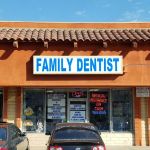How to Maintain Oral Health as You Age: Essential Tips for a Healthy Smile
- 1. The Importance of Oral Health as You Age
- 2. Common Oral Health Issues in Older Adults
- 3. Tips for Maintaining Oral Health as You Age
- 4. The Role of Diet and Lifestyle in Oral Health
- 5. The Importance of Regular Dental Visits
1. The Importance of Oral Health as You Age
As we age, maintaining good oral health becomes more crucial than ever. Poor oral health can affect your overall well-being, contributing to conditions like gum disease, tooth loss, and even heart disease. Regular care is essential to maintain a healthy smile and avoid complications that could impact your quality of life.
Good oral health helps preserve not only your teeth and gums but also your self-esteem, as a healthy smile can improve confidence and social interactions. Furthermore, taking care of your mouth is an investment in your overall health, preventing issues that can complicate other medical conditions such as diabetes and respiratory infections.
2. Common Oral Health Issues in Older Adults
Older adults face unique challenges when it comes to oral health. Here are some of the most common issues:
- Dry Mouth: As we age, the production of saliva may decrease, leading to dry mouth. This can make it harder to chew, swallow, and speak, and can also increase the risk of cavities and gum disease.
- Gum Disease: Gum disease, or periodontal disease, is a prevalent issue for seniors. It can lead to gum recession, tooth sensitivity, and even tooth loss if not managed properly.
- Tooth Sensitivity: Many older adults experience increased tooth sensitivity due to receding gums, worn-down enamel, or cavities. This sensitivity can make certain foods and beverages uncomfortable to consume.
Recognizing these common issues early can help you take the necessary steps to address them and prevent more serious problems from developing.
3. Tips for Maintaining Oral Health as You Age
There are several effective strategies to ensure your oral health remains intact as you get older. These include:
- Brush and Floss Regularly: Brush your teeth at least twice a day with fluoride toothpaste, and floss daily. This helps remove plaque and food particles that can lead to tooth decay and gum disease.
- Use Mouthwash: Rinsing with an antimicrobial mouthwash can help reduce plaque buildup and fight bacteria, especially for individuals with dry mouth.
- Stay Hydrated: Drinking plenty of water helps maintain saliva flow, preventing dry mouth and keeping your teeth and gums moisturized.
By incorporating these habits into your daily routine, you can ensure that your mouth stays healthy and prevent common oral health problems from escalating as you age.
4. The Role of Diet and Lifestyle in Oral Health
Your diet and lifestyle choices play a significant role in maintaining good oral health as you age. Here’s what you can do:
- Eat a Balanced Diet: A diet rich in fruits, vegetables, whole grains, and lean proteins provides essential vitamins and minerals that support strong teeth and gums. Foods like cheese, nuts, and leafy greens are particularly good for oral health.
- Avoid Sugary Snacks and Drinks: Limiting sugary foods and beverages can help prevent tooth decay and gum disease, both of which become more problematic as you age.
- Avoid Tobacco: Smoking and other tobacco products increase the risk of gum disease, tooth loss, and even oral cancer. Quitting tobacco can significantly improve your oral and overall health.
By making healthy choices, you can greatly reduce the risk of developing serious oral health issues and enjoy a better quality of life.
5. The Importance of Regular Dental Visits
Regular dental checkups are crucial for maintaining oral health as you age. Visiting your dentist at least twice a year allows them to detect problems early and provide treatment before they become more serious. Professional cleanings help remove plaque and tartar buildup, which can’t be addressed with brushing and flossing alone.
If you have specific oral health concerns, such as dry mouth or gum disease, your dentist may recommend specialized treatments or adjustments to your oral care routine. Dental professionals can also provide advice on managing oral health in aging adults and help you create a plan tailored to your needs.
Don’t wait until problems arise—regular visits to your dentist are key to maintaining long-term oral health.







 Fair Oaks Orthodontics5.0 (29 review)
Fair Oaks Orthodontics5.0 (29 review) E3 Dental4.0 (18 review)
E3 Dental4.0 (18 review) Dr. Daniel V. Abarca, DDS3.0 (8 review)
Dr. Daniel V. Abarca, DDS3.0 (8 review) Julian S. Drew DDS PA5.0 (272 review)
Julian S. Drew DDS PA5.0 (272 review) Dental Dreams - Cottman3.0 (1666 review)
Dental Dreams - Cottman3.0 (1666 review) Dental Solutions of Roxborough4.0 (219 review)
Dental Solutions of Roxborough4.0 (219 review) The Importance of Oral Health Education During Pregnancy for a Healthy Pregnancy
The Importance of Oral Health Education During Pregnancy for a Healthy Pregnancy Best Tips for Brushing Your Teeth Properly for Healthy Gums: Essential Techniques for Oral Health
Best Tips for Brushing Your Teeth Properly for Healthy Gums: Essential Techniques for Oral Health Why Skipping Dental Checkups Can Lead to Bigger Oral Health Problems
Why Skipping Dental Checkups Can Lead to Bigger Oral Health Problems Advantages of Porcelain Dental Restorations
Advantages of Porcelain Dental Restorations How Can Diabetes Cause Tooth and Gum Problems? Preventing and Managing Oral Health Issues
How Can Diabetes Cause Tooth and Gum Problems? Preventing and Managing Oral Health Issues Healthy Habits for Promoting Good Oral Health and Hygiene: Tips for a Healthy Smile
Healthy Habits for Promoting Good Oral Health and Hygiene: Tips for a Healthy Smile